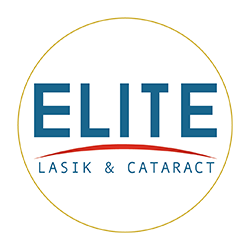CATARACT
DIAGNOSIS &
TREATMENT
What is a Cataract?
A cataract is when the clear lens of the eye becomes cloudy, which is caused by a build-up of protein. When you reach about 60 years old, you are more likely to develop advanced cataracts that can affect your vision. This is a natural process that happens as a person ages.If you have a cataract, you might experience vision problems like blurry, cloudy or dim vision, especially at night. You could also have light sensitivity and see halos around lights. Fading or yellowing of your vision, or double vision in one eye, are also symptoms of cataracts.
Cataract Surgery Offerings at Elite LASIK & Cataract
Standard Procedure
A standard cataract procedure can correct either distance or up close vision, and this procedure is typically covered by insurance and Medicare. Patients who choose the standard lenses may still need to wear glasses when driving or reading.
Lens Upgrades
Upgraded lenses are available out-of-pocket if you want to decrease your dependence on glasses after surgery. Multifocal lenses can correct both up close and distance vision, and astigmatism can also be corrected, depending on which package you choose.
One of our lens upgrades is the cutting edge Light Adjustable Lens, a new type of intra-ocular lens that can be custom shaped to fit the eye of every patient that receives it, ensuring perfect or near perfect vision.

A Doctor You Can Trust
More than anything, we are proud of our team and the relationships that we maintain with all of our patients. Our compassionate, innovative, and experienced team will always be there for you.
We know having an eye care procedure can be a stressful time in your life. Our physicians are here for you every step of the way to answer your questions, make sure you have a relaxing visit, and provide you with the best eye care possible.
The field of eye care is rapidly evolving and our ophthalmologists remain at the cutting edge. ELITE LASIK & Cataract is always at the forefront of the new procedures, and we offer a full scope of advanced technology, diagnostic testing, and treatment.

Why Cataract Surgery?
Cataract surgery can restore your blurred or cloudy vision that is caused by the cataract. Lens upgrades during the procedure could even reduce your dependence on glasses and contacts after the surgery.


Will My Insurance Cover Cataract Surgery?
Fast Facts
How to Know if You Are a
Candidate for Cataract Surgery
If your vision is blurry or cloudy due to cataracts, and this visual impairment interferes with your activities of daily living, it is likely that you are a suitable candidate for cataract surgery. The best way to determine your candidacy is to schedule a consultation with the team at Elite LASIK & Cataract.
How Cataract
Surgery Works
During cataract surgery, the cloudy lens is removed and replaced with an artificial lens, called an intraocular lens (IOL), which helps you see clearly again. Modern cataract procedures involve the use of an ultrasound device that breaks up the cloudy lens into small pieces, and those pieces are removed from the eye with suction.
Secondary Cataracts
Several weeks, months or years after cataract surgery, some patients may develop vision impairments again and worry that their cataract has “grown back.” But, that’s not the case.
In some cases, the posterior lens capsule can become cloudy in several weeks, months, or years following cataract surgery. In medical terms, this is called posterior capsular opacification (PCO). This is also sometimes referred to as a secondary cataract.
A secondary cataract can be eliminated with a YAG laser capsulotomy, which is a quick, in-office procedure. The specialized laser creates a clear “window” in the cloudy capsule (sack) that the lens is sitting in, which allows your vision to be clear again. The YAG procedure is a quick, painless procedure that usually does not need to be done again.
What the Recovery is Like
Cataract surgery is performed on an outpatient basis. After the procedure, you will be monitored in a recovery area for a short period of time and then released to return home. A companion should drive you home and help you get into a comfortable resting position.
You might have a burning or gritty sensation in your eyes right after surgery, but this is only temporary. You will need to wear an eye shield while sleeping and take special eyedrops for a few days after surgery.
You will follow up with our team the day after your procedure so we can check your healing progress and answer any questions you have. You should get a ride to the appointment and we will clear you to drive during the appointment if we feel you are ready.
Initially, your vision will be blurry after surgery as your eyes heal and adjust. Within a few days of surgery, you should notice an improvement in the clarity of your vision and the vibrancy of colors.
Our Indianapolis Cataract
Surgery Vision Pledge
Schedule Your Consultation!
How to Prepare for Your Procedure
Fast After Midnight
Do not eat or drink anything after midnight, the night before your procedure. Morning medication can be taken with a small sip of water.
Minimize Your Morning Routine
Wash your face well with soap and water the morning of your procedure but do not wear any makeup, hair products, perfume, aftershave or lotion on the day of your procedure.
Bring a Friend or Family Member
You’ll need to arrange for someone to bring you in for the procedure and pick you up once the procedure is completed. Your guest is more than welcome to accompany you through your procedure. If they wish, they may watch your procedure live from our “friends and family viewing area.” If your guest chooses not to view the procedure, they may wait in our comfortable lounge or simply return to the center one hour after your arrival time.
Review the Informed Consent Document
Take the time to read the Informed Consent document prior to the day of your procedure. Please do not sign the document until you are with your surgeon on the day of your procedure. Additionally, if you happen to develop a cold sore the week of your surgery, please call us to let us know. For your safety, it may be best to reschedule your procedure if you have a cold sore.
FAQs
Who gets cataracts?
Can cataracts be prevented?
There is no proven way to prevent the formation of cataracts. However, experts believe that healthy lifestyle habits such as not smoking, eating a balanced diet and avoiding excessive exposure to sunlight may delay or prevent cataract development.
Does cataract surgery hurt?
No. Your eyes will be numbed and you will be given a sedative medication to make you more relaxed and comfortable during your procedure. After the procedure, you might have a temporary burning or gritty sensation in your eyes.
How do I prepare for cataract surgery?
You will receive thorough pre-operative instructions to follow in the days and weeks leading up to your procedure. Importantly, you will need to use prescription eye drops several days before surgery to prevent inflammation, infection and pain during and after your procedure.
Do intraocular lenses need to be replaced?
No, your intraocular lenses are permanent and do not need to be replaced.
How much time will I need to take off work after cataract surgery?
Most patients take a day or two off from work to recover from surgery.
How soon can I resume exercising after my surgery?
You can take short walks and resume light exercise as soon as you feel ready, but you should avoid heavy lifting (more than 20 pounds) and strenuous exercise for a few weeks.
Will I need to wear sunglasses after cataract surgery?
Yes. As your eyes heal from surgery, it is critical to protect them from sun exposure by wearing sunglasses and a wide-brimmed hat.
